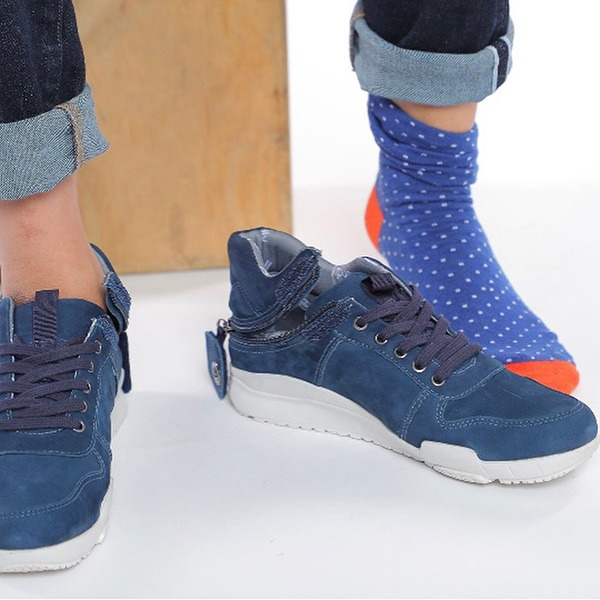Stepping Forward with Multiple Sclerosis: Navigating the World of Footwear for Comfort and Support
Living with Multiple Sclerosis (MS) presents a myriad of challenges, both physical and emotional. One of the most common symptoms of MS is difficulty with mobility, which can significantly impact everyday activities like walking. As someone living with MS, finding the right footwear is not just about fashion—it’s about finding comfort, stability, and support to navigate the challenges of each day. In this blog post, we’ll explore the importance of footwear for those with MS and offer some tips on selecting the best shoes to support your journey.
Understanding Multiple Sclerosis and Its Impact on Mobility
Multiple Sclerosis (MS) is a chronic autoimmune disease that affects the central nervous system and disrupts the flow of information within the brain and between the brain and the body. One of the hallmark symptoms of MS is fatigue, which can exacerbate other symptoms such as weakness, numbness, and difficulty with balance and coordination. These symptoms can make walking particularly challenging for individuals living with MS.
Walking difficulties in MS can arise from various factors, including muscle weakness, spasticity, balance problems, and sensory disturbances. As a result, individuals with MS often experience gait abnormalities, such as foot drop (difficulty lifting the front part of the foot), which can increase the risk of tripping and falling. Additionally, foot pain and discomfort are common due to changes in sensation and gait patterns.
The Importance of Proper Footwear
Choosing the right footwear is important for anyone, but it holds particular significance for individuals living with MS. The right shoes can provide comfort, stability, and support, helping to mitigate the challenges associated with walking and reducing the risk of injury. Here are some key considerations when selecting footwear for MS:
- Comfort: Comfort should be a top priority when deciding footwear. Search for shoes with cushioned insoles and enough room in the toe box to accommodate any foot issues like swelling that may occur. Also, consider lightweight and breathable materials. These can help prevent overheating and discomfort, especially for those who experience sensory disturbances.
- Support: Proper support is crucial for individuals with MS, as it can help compensate for muscle weakness and instability. Look for shoes with firm arch support and sturdy heel counters to promote proper alignment and reduce the risk of ankle rolling. A supportive midsole can also help aid in absorbing shock and reduce pressure on the feet and joints.
- Stability: Stability is crucial for maintaining balance and preventing falls, especially for individuals with MS who may experience gait abnormalities. Choose shoes with a non-slip sole and a secure closure system to ensure an appropriate fit and minimize the risk of tripping. Avoid shoes with high heels or narrow bases, as they can compromise stability and increase the risk of falls.
- Flexibility: While support and stability are crucial, choosing shoes that allow for natural foot movement is also essential. Look for shoes with a flexible sole that bends easily at the ball of the foot, allowing for a smooth and efficient gait. Avoid shoes that are too rigid and stiff, as they can impede mobility and exacerbate foot fatigue.
Tips for Selecting Footwear
When it comes to finding the right footwear for living with Multiple Sclerosis, attention to detail can make a significant difference in your comfort and mobility. Consider the following tips to help you choose the best shoes for your specific needs:
- Get properly fitted: The first step in finding the right footwear is having your feet measured. Many people with MS experience changes in foot size and shape due to factors such as swelling, muscle weakness, or deformities. A professional fitting ensures you find shoes that accommodate these changes and provide a comfortable fit.
- Try before you buy: Don’t be afraid to spend some time walking around the store in different styles and brands of shoes. Pay attention to how each pair feels on your feet, checking for any rubbing, pinching, or discomfort areas. If possible, walk on different surfaces to get a sense of how the shoes perform in real-world conditions.
- Consider your specific needs: Everyone’s experience with MS is unique, so it’s essential to consider your individual symptoms and mobility challenges when choosing footwear. If you experience foot drop or other gait abnormalities, look for shoes with features such as rocker soles or built-in braces that can help compensate for these issues. If you have sensory disturbances, opt for shoes with soft, seamless interiors to minimize irritation.
- Think about your daily activities: When selecting footwear, consider the activities you engage in regularly. If you spend a lot of time on your feet, look for shoes with extra cushioning and support to reduce fatigue. If you participate in specific sports or activities, consider whether specialized footwear, such as running shoes or hiking boots, might suit your needs.
- Consult a healthcare professional if needed: If you have significant mobility issues or foot-related complications associated with MS, consider seeking advice from a healthcare professional, such as a physical therapist or orthopedic specialist. They can offer personalized recommendations for footwear and may prescribe custom orthotics or braces to address specific concerns.
- Don’t forget about style: While comfort and functionality should be your primary considerations, that doesn’t mean you must sacrifice style. Fortunately, many footwear brands offer stylish options that also provide the comfort and support you need. Look for shoes that reflect your personal style and make you feel confident and empowered.
- Invest in quality: Finally, remember that investing in high-quality footwear is an investment in your health and well-being. While it may be tempting to opt for cheaper options, quality shoes will likely last longer and provide better support and durability over time. Consider it a worthwhile investment in your comfort and mobility.
Conclusion
Living with Multiple Sclerosis presents numerous challenges, particularly when it comes to mobility and walking. However, with the right footwear, individuals with MS can improve their comfort, stability, and overall quality of life. By prioritizing comfort, support, stability, and flexibility and following the tips outlined above, you can find the perfect shoes to support your journey with MS. Remember, investing in proper footwear is not just about fashion—it’s about empowering yourself to navigate the world with confidence and independence, one step at a time.
Frequently Asked Questions: Footwear and Multiple Sclerosis
Why is footwear important for individuals with Multiple Sclerosis (MS)?
Proper footwear is crucial for individuals with MS because it provides the necessary comfort, stability, and support to address the mobility challenges posed by the condition. MS can cause fatigue, muscle weakness, balance problems, and sensory disturbances, making walking difficult and potentially dangerous.
What key features should I look for in shoes if I have MS?
Prioritize these features when selecting footwear:
- Comfort: Look for shoes with cushioned insoles, ample toe box space, and breathable materials to prevent discomfort and overheating.
- Support: Opt for shoes with firm arch support, sturdy heel counters, and a supportive midsole to enhance stability and reduce strain on feet and joints.
- Stability: Choose shoes with non-slip soles, secure closures, and avoid high heels or narrow bases to minimize the risk of falls.
- Flexibility: Select shoes with flexible soles that bend at the ball of the foot, allowing for natural foot movement and reducing fatigue.
Why is getting properly fitted for shoes particularly important for people with MS?
Many people with MS experience changes in foot size and shape due to swelling, muscle weakness, or deformities. Professional fitting ensures you get shoes that accommodate these changes and fit comfortably.
How can I be sure the shoes I choose will be comfortable throughout the day?
Don’t hesitate to spend time walking around the store in the shoes before purchasing. Pay attention to how they feel on your feet, checking for any rubbing, pinching, or discomfort. Walking on different surfaces can also give you a sense of their real-world performance.
What if I have specific gait abnormalities or foot-related issues due to MS?
If you experience issues like foot drop or sensory disturbances, consider shoes with features like rocker soles, built-in braces, or soft, seamless interiors. Consult a healthcare professional, such as a physical therapist or orthopedic specialist, for personalized recommendations.
Should I consider my daily activities when selecting footwear for MS?
Absolutely! If you’re on your feet a lot, prioritize extra cushioning and support. For specific sports or activities, explore specialized footwear like running shoes or hiking boots tailored to those needs.
Do comfortable and supportive shoes for MS have to be stylish?
Not at all! Many brands offer stylish footwear that provides the necessary comfort and support. Look for options that reflect your style and boost your confidence.
Is investing in high-quality footwear important for individuals with MS?
Yes, consider high-quality footwear an investment in your health and well-being. While potentially pricier upfront, they offer better support, durability, and longevity, ultimately proving more cost-effective and beneficial for your comfort and mobility.







